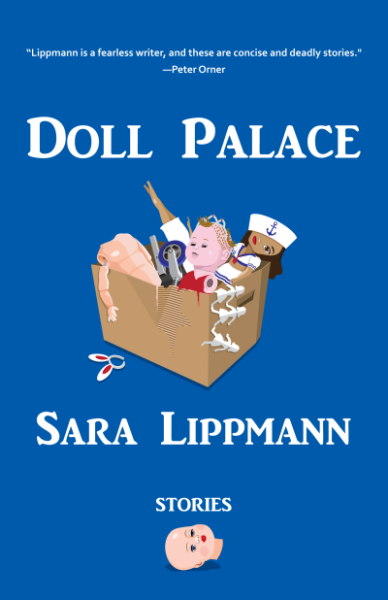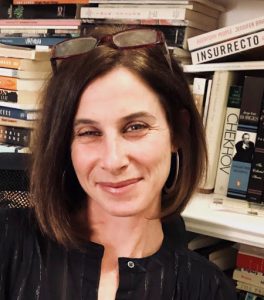
Check out our Instagram this week for a chance to win a copy of Sara Lippmann’s collection!
Interviewed by Shasta Grant
Your collection of short stories, DOLL PALACE, is being re-released by 7.13 Books, which I know many people (myself included) are absolutely thrilled about! Do you have a favorite story from this collection? Or is that like asking you to pick a favorite child?
Thank you for the kind words. It’s been strange, revisiting these stories, poring over proofs again after all these years. On the one hand, I am a different writer, in the sense that we all become different writers through new stories or projects or books. Each piece is like a wet slap of paper mache on the mold of our being. Which is to say, everything we do is what makes us. These stories came out of a very specific time in my life, and I feel grateful to have them, as testament and record. The voice and tone, the commitment to the line, and the honesty still ring true. The collection reflects a worldview driven by a dominant (white, male) culture with its narrow trappings of social expectation. In this way, they are generational. I show my age. They are claustrophobic stories of quiet rebellion, of ironic performativity, and inadequate protest. They dwell in contradiction and double standards. I don’t know that I have a favorite, but there are a handful that I see as pivotal, as cornerstones of a larger outlook on selfhood. “Whipping Post” mines the fucked-up messaging of adolescence and sexuality. “Tomorrowland” and “Body Scan” focus on the transactional aspects of the marriage plot, with its restrictive, inextricable ties to capitalism. “Girl” and “Reunion” excavate similar truths about motherhood.
The re-release has a very cool new cover. I especially love that there is a nod to the paper dolls from the original cover. Can you give us the behind-the-scenes scoop on the process for the cover? Were you able to offer your ideas and input on it?
It’s been a wonderful collaboration, and I am so thankful to Gigi Little for her vision — and to Leland Cheuk for his input — and to both of them for their infinite patience. I was attached to my old cover, with the crumpled doll in a rainbow of paper dolls, for all that it said and didn’t say, and I love that we included a nod to the old cover in the new. I had this idea about a box of unwanted items on the curb. I don’t know if this is a Brooklyn thing or what but they are everywhere, often accompanied by the word FREE or TAKE. Once we had the box, it became a question of how the broken bodies and objects might fit. We went through a bunch of rounds until we settled on the final. I love it.
You’ve got a new collection, JERKS, coming out in 2022 from Mason Jar Press. Can you tell us about this new collection? Are the stories similar to the stories we know and love in DOLL PALACE?
YES! As I said, I do think we are constantly evolving as humans, as writers. If we’re not static, the work is not static either, or at least that’s the idea. The stories in JERKS feel very much in conversation with DOLL PALACE. I mean, I own my shit. If we all write our obsessions, mine are clearly desire and disconnect, selfhood, motherhood, marriage, patriarchal entrapment, etc. JERKS is probably funnier — or at least I think (I hope) the stories are funnier — and also angrier. They are perhaps less claustrophobic and more outward looking. And I dunno, maybe more upfront with sex and lust. The title speaks to a circle jerk, yes. But it’s not all masturbation. And it’s not all beef jerky. It’s how people are and err and what they want and how they change and who they long to be. There is tenderness among the rage. Like in Doll Palace, there is always some kind of reach for connection. Another difference is Mason Jar Press is committed to producing short, tight, meaty books, so a lot of the stories in the original manuscript wound up on the cutting room floor in order to hit their 40K word limit. Hopefully, the result is lean and mean. I’m pumped for it.
We all have different ways of measuring success. Most writers keep their failures close to the chest, which is unfortunate because most of us are very familiar with failing, and in that failing we often feel alone because nobody is talking about it. I recently heard Charles Baxter speak in a Zoom event and he said the first three novels he wrote were never published (and he claims they weren’t very good). I think about failure all the time, as well as the question of whether everything we write needs to (or even should be) published. I’m very curious about your own thoughts on this topic.
I’m writing an essay on failure right now. I’ve been writing it for some time, and I don’t know I’ll ever publish it as it’s basically just me showing my self-pitying ass and who wants to see that. But I agree that most essays on failure are written by decorated authors from the other side — after having achieved some measure of widespread conventional success and thus are cloaked in safety with the attendant stink of smugness and disingenuity — and I bristle against that, too. You don’t often see thoughts from the murky mess of it.
Which is the whole thing. Sure, some stumble upon overnight success and all the power to you. But for many of us it’s been a helluva road. I’ve had so many conversations with writers recently about their own ups and downs with agents and submissions, manuscripts and marketplace, which is what got me grappling with it all on the page. So much of this shit is simply not talked about — just like the ugly undersides of pregnancy or marriage are not talked about, or only whispered about in invite-only circles, and I feel that does a gross disservice. Only by talking openly and vulnerably with people have I begun to sort through my own very twisted notions of success that have been fed to me, and to which I’ve long subscribed. I’m no spring chicken. I’ve been at this game for a while, and I could have benefited from real talk years ago instead of berating myself until it froze the very movement of my pen.
Without getting too deep into it — or boring anyone — I woke up at 45 in the middle of a pandemic suffocating from the capitalist dictates that success is purely monetary. My book, LECH, a character novel that explores the predatory aspects of human nature, went out this summer. It has not sold. By all external accounts, and by standards upheld by family members, that makes me a colossal failure. As in, throw in the towel. Give it up. You tried.
My essay is about reckoning with social pressure and false messages and arriving at this fuck-all place where I can reject much of that — where I can embrace my integrity and keep my head down, and just do the goddamn work. (Of course, there is gross privilege within that, as I am not relying on my writing to put food on the table. And a significant part of my essay is about acknowledging that too, how I’ve benefited from the framework of a marriage in which I am not the breadwinner.) Anyway, it is an essay that rails against a narrow allowance of success, much in the same way my fiction pushes against restrictive formulas of how a woman (a girl/ a mother/ a wife/ a person) should be in the world. It urges us to abdicate the “hard work pays off” mantra for the bullshit it is, to resist the system as much as we can, and to redefine our understanding of success outside the patriarchal pat of mainstream industry.
And yet, who doesn’t want the pat of industry? Therein lies the contradiction. Of course, I want to get paid for my work. Like it or not, we live under capitalism. I would love a book deal, but more: I would love readers to find my work and connect with it deeply and expansively. At the same time, I am no longer ceding my self-worth to a six figure (to any figure) announcement in Publishers Marketplace. I wrote a novel that I believed in, that I still believe in, and that’s all I can say about it, other than each project changes us. I am no longer the writer I was when I started it. If anything, now that I’ve “lost,” so to speak, I feel less afraid, more emboldened, less precious in my attitude toward my writing, and more honest in my storytelling than ever before. All I’ve got is my narrative gut to trust. Hopefully, my new project (for there is always another project) will embody some of that.
As for the second part of your question, whether everything you write should be published, no. I mean, coming from magazines I do tend to write with publication in mind as final closure. Maybe my novel is a disaster and its failure is a saving grace. But the ugly ones can be loved too, for what they document in that moment, even if we are forever changing. Sure, some things — especially if they are written from a place of stinginess or out of revenge or what have you — are better left in the drawer.
Often we write — as Didion famously said, in order to know what we think. My essay on failure is just that. It’s a paradoxical bog. I don’t know I’ll ever sort through my thoughts well enough to publish in any cogent fashion, or if the bog might be instructive in its own right. There are no easy answers. When you’re in the thick you can’t see where you’re going but step anyway, regardless of puddle or land.
_____________________________
 Sara Lippmann is the author of the story collections DOLL PALACE, re-released this month by 713 Books, and JERKS, forthcoming in 2022 from Mason Jar Press. She was awarded an artist’s fellowship in fiction from New York Foundation for the Arts, and her stories have been anthologized in The Best Small Fictions 2020 (Sonder Press), Mamas and Papas (San Diego City Works Press) and forthcoming in New Voices: Contemporary Voices Confronting the Holocaust (Blue Lyra Press). She lives in Brooklyn and on twitter @saralippmann.
Sara Lippmann is the author of the story collections DOLL PALACE, re-released this month by 713 Books, and JERKS, forthcoming in 2022 from Mason Jar Press. She was awarded an artist’s fellowship in fiction from New York Foundation for the Arts, and her stories have been anthologized in The Best Small Fictions 2020 (Sonder Press), Mamas and Papas (San Diego City Works Press) and forthcoming in New Voices: Contemporary Voices Confronting the Holocaust (Blue Lyra Press). She lives in Brooklyn and on twitter @saralippmann.
 Shasta Grant is the author of the chapbook Gather Us Up and Bring Us Home (Split Lip Press, 2017). She won the 2015 Kenyon Review Short Fiction Contest and the 2016 SmokeLong Quarterly Kathy Fish Fellowship. She has received residencies from Hedgebrook and The Kerouac Project and was selected as a 2020 Aspen Words Emerging Writer Fellow. Her work has appeared in cream city review, Epiphany, Hobart, wigleaf, and elsewhere. She has an MFA from Sarah Lawrence College and divides her time between Singapore and Indianapolis.
Shasta Grant is the author of the chapbook Gather Us Up and Bring Us Home (Split Lip Press, 2017). She won the 2015 Kenyon Review Short Fiction Contest and the 2016 SmokeLong Quarterly Kathy Fish Fellowship. She has received residencies from Hedgebrook and The Kerouac Project and was selected as a 2020 Aspen Words Emerging Writer Fellow. Her work has appeared in cream city review, Epiphany, Hobart, wigleaf, and elsewhere. She has an MFA from Sarah Lawrence College and divides her time between Singapore and Indianapolis.

 The core workshop of SmokeLong Fitness is all in writing, so you can take part from anywhere at anytime. We are excited about creating a supportive, consistent and structured environment for flash writers to work on their craft in a community. We are thrilled and proud to say that our workshop participants have won, placed, or been listed in every major flash competition. Community works.
The core workshop of SmokeLong Fitness is all in writing, so you can take part from anywhere at anytime. We are excited about creating a supportive, consistent and structured environment for flash writers to work on their craft in a community. We are thrilled and proud to say that our workshop participants have won, placed, or been listed in every major flash competition. Community works.